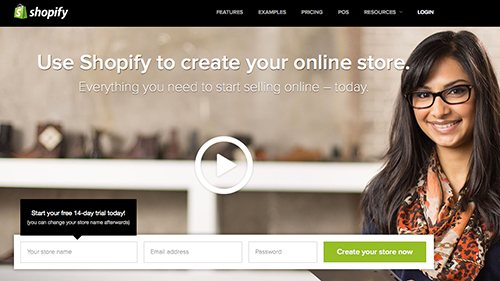10 Great Reasons To Have A Shopify Website For Your E-commerce Business
Having recently launched two Shopify e-commerce websites (Alexandra May Jewellery and Captain Fawcett Ltd), we're now close to finishing our third. So I thought I'd put together a few reasons why online retailers should consider using this popular platform.
Shopify was founded in 2004 by Tobias Lütke, Daniel Weinand, and Scott Lake. After Lütke, a programmer by trade, could not find a product that matched their store's needs, he decided to build one of his own.
He therefore designed a custom store coded in an open source platform called Ruby on Rails. After two months, he had a working online store and his website was launched. By 2006, the founders decided to share their code to help others sell items online. Lütke created a template for online stores, in which clients would provide the pictures and products. Shopify was launched in June 2006.
Since its launch, Shopify has been well received by popular tech websites such as CNET, who say the platform is “clean, simple, and easy-to-use.” The service was profiled in world publications including The Wall Street Journal, The New York Times, The Globe and Mail, The Financial Post, TechCrunch, and Mashable.
So what do we love about Shopify?
1. You get a 14 day free trial. No catches and no payment details required. That means you can have a play around and see how you get on, with no commitment unless you're impressed.
2. They have a vast range of themes (or templates) suitable for any e-commerce business, from fashion to jewellery, grooming products to office stationery. If you have the time to work it out yourself you could build your own website, but my advice would be to involve a developer and not be afraid to ask for some changes to the template you choose. That way the result is an off-the-shelf option that looks bespoke. Costs for these themes range from completely free to around $200.
3. The back end of the platform is extremely easy to pick up. The latest client I've been working with learnt how to use it in no time, and commented on how much easier it is to use than her previous WordPress e-commerce website. If you're moving over from another platform you can simply upload a csv file of your product data and pre-populate the fields in one hit. Be prepared to spend time doing some fine tuning afterwards, but it could save you weeks of manual labour adding each product individually.
4.Shopify's support is excellent - you can contact them by email, live chat, or telephone. In my experience it's best to call if you have an emergency as emails can take a little longer to be dealt with.
5. With stiff competition coming from all quarters, SEO (search engine optimisation) is foremost on every online retailer's mind. Shopify has a built in analytics function that can help you keep track of your online store’s growth, and you can easily integrate Google Analytics into the mix. The website optimiser ensures that any updates you make to your store will be ready for the search engines, although you may wish to do some tweaking once you've worked your way around the system.
Shopify includes powerful SEO features in all plans, including:
- Editable title tags, meta descriptions and URLs for your pages
- Editable ALT tags for all images, customisable image file names
- Automatically generated sitemap.xml and robots.txt files
- Automatically generated canonical URL tags (to stop duplicate content)
6. The mobile version of your website will look stunning on any device. It may need a little fine tuning, but the basics are there - built in.
Why is this relevant to you? Because in e-commerce, the mobile revolution is here. If you want to increase your sales, and create a superb end to end customer experience the mobile version of your website should look great and be extremely easy to use.
In 2012, people spent $25 billion on purchases made from phones and tablets, an increase of 81 percent from the year before, according to eMarketer, which compiles data from 120 sources that track commerce.
7. With the fantastic Shopify Mobile app, you can easily manage your online store from your iPhone or iPod. An alert pops up whenever you receive a new order, and you can view and manage your sales, product listings and customers in just a few simple steps.
8. Security of customer information is crucial when it comes to online retailing and Shopify is Level 1 PCI DSS compliant. This certification is not limited to Shopify alone - it applies to your online store securing both your data and your clients’ confidential details. In addition, Shopify has an order management tool that helps you detect fraud plus a team of specialists are responsible for alerting you about possible fraud.
9. Blogs and News pages are a must for most e-commerce businesses. Fresh, keyword rich content is welcomed by the search engines and helps you rise in those all-important search results. Shopify has a built in blogging system and you can add as many different ones as you like to your website.
10. Shopify has more apps (or plugins) than you can shake a stick at. Whether you're looking for tools for Cross Selling, a Wish List, a Gallery, Abandoned Cart functionality, or just about anything else to do with selling online, you'll find it in the app store. Results can be a little hit and miss so make sure you read the reviews and do some research first.
Of course you'll also want to know what Shopify charge for hosting their websites. That depends on how large your online store is and how many products you need to stock. But here's an indication...
If you have any questions about this article, please feel free to get in touch.










